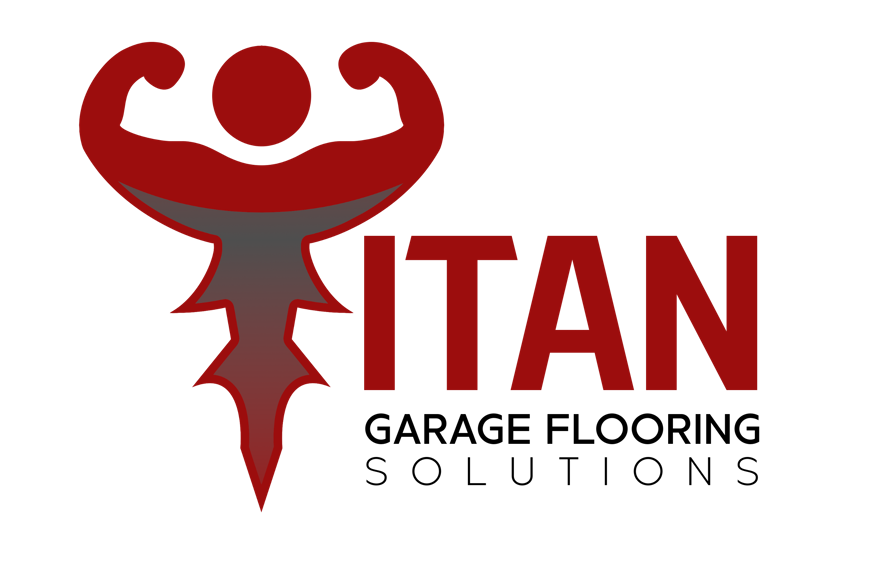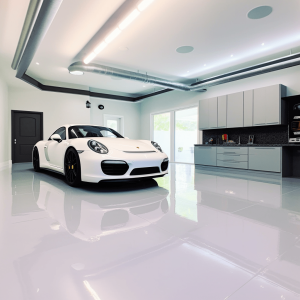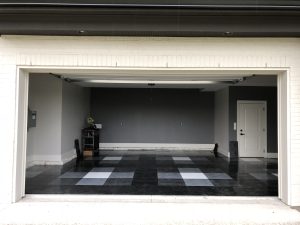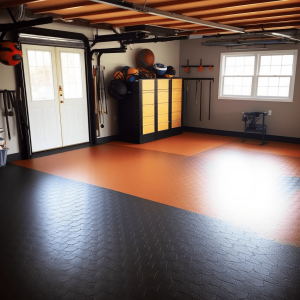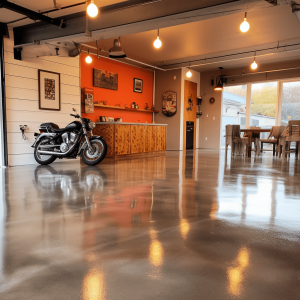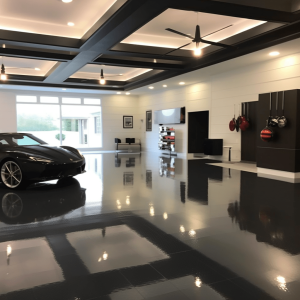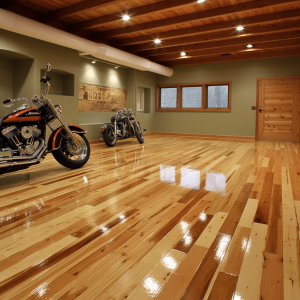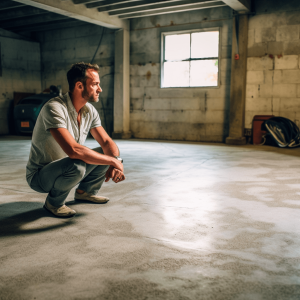
Introduction:
Garages serve as multifunctional spaces, ranging from parking vehicles to serving as workshops or storage areas. When it comes to selecting flooring for your garage, durability, functionality, and aesthetics are some of the essential considerations. No doubt about it, several flooring options are available, each with its own set of advantages and disadvantages. This guide will explore various types of garage flooring, providing a comprehensive overview of the pros and cons of each option.
I. Plain Old Concrete Flooring
Concrete flooring is the most common and traditional foundation for garages due to its affordability and durability. Chances are, when you bought your home, your garage came with concrete floors. Concrete offers a solid foundation and withstands heavy traffic, making it suitable for various purposes. However, raw concrete has certain drawbacks that may require additional treatments or coatings.
Pros of Concrete:
- Durability: Concrete floors are highly resilient and can endure heavy loads, abrasion, and impacts.
- Low maintenance: They are fairly easy to clean and require minimal upkeep.
- Affordability: Concrete is generally cost-effective compared to other flooring options.
- Versatility: Concrete can be stained, painted, or coated to enhance its appearance.
Cons of Concrete:
- Porous nature: Untreated concrete is porous, making it susceptible to stains, moisture absorption, and cracking. Chances are good if you have four-season weather like we do here in Nashville, Atlanta, Dallas and Tampa, your concrete floors will crack with time.
- Cold and hard: Concrete can be uncomfortable to stand on for extended periods and may lack insulation.
II. Epoxy Coatings
Epoxy coatings were and still are a popular choice for “upgrading” concrete floors. They can provide an attractive finish while increasing durability and resistance to most stains and chemicals. However, proper installation with long cure times and maintenance are crucial for long-lasting results.
Pros:
- Aesthetics: Epoxy coatings offer a sleek, glossy appearance and are available in a variety of colors and finishes.
- Protection: Epoxy acts as a protective layer, enhancing the durability of the underlying concrete and guarding against stains, chemicals, and abrasion.
- Easy to clean: The smooth surface of epoxy coatings makes them much easier to maintain. Usually, you just need mild dish soap, water, and a mop.
Cons:
- Installation complexity: Proper installation requires meticulous surface preparation and professional expertise. Most epoxy floors require 5 to 7 days to properly cure before you can drive on them, and that’s in ideal conditions.
- Vulnerability to UV exposure: Direct sunlight can cause the epoxy to yellow and deteriorate over time, making it less suitable for garages with significant sun exposure.
- Vulnerability to hot tire pickup: Hot tires can create adhesion issues and cause epoxy coatings to peel or blister. One of our clients after waiting the recommended full 7 days for their epoxy application to cure, drove their heavy Tesla Model X onto it. The next day, the epoxy pulled right up on three of the four tires. They eventually called us and we applied our polyaspartic coating which has held up much better.
III. Interlocking Floor Tiles:
Interlocking floor tiles are a modular flooring option that offers versatility and ease of installation. They come in various materials such as PVC, rubber, or polypropylene, each with its unique features and suitability for different applications.
Pros:
- DIY-friendly installation: Some options in the marketplace offer interlocking tiles that require little adhesive or special tools, allowing for easier installation and reconfiguration. Still, you may have to work to make it fit just right.
- Aesthetic customization: Tiles are available in a wide range of colors, patterns, and textures, enabling creative design possibilities.
- Comfort and insulation: Some tile materials, like rubber, offer better shock absorption and insulation properties, making them more comfortable to stand on and reducing noise.
Cons:
- Vulnerability to shifting: Tiles may shift or separate over time, especially under heavy loads or frequent vehicular traffic, requiring periodic adjustments. In fact, manufacturers like RaceDeck recommend that you leave a full two inches between your floors and garage walls so that when you roll cars over them they don’t bunch up. This can become frustrating quickly, especially as temperatures and humidity cause the floors to naturally move.
- Limited moisture resistance: While many tiles have water-resistant properties, excessive moisture or standing water can seep through the interlocking seams, potentially causing damage. Be sure to confirm how your floors will drain and prevent mold from forming.
- Higher costs: Interlocking tiles are generally more expensive than basic concrete or epoxy coatings, particularly for premium materials.
IV. Rubber Flooring:
Rubber flooring is a resilient and versatile option suitable for various garage applications. It offers excellent shock absorption, insulation, and slip resistance, making it particularly advantageous for workshops or gym areas.
Pros:
- Durability and cushioning: Rubber flooring can withstand heavy impacts and provide ergonomic support, reducing fatigue and protecting tools or equipment.
- Slip resistance: Rubber surfaces offer good traction, even when wet, ensuring safety in potentially slippery environments.
- Sound insulation: Rubber absorbs sound, reducing noise transmission and enhancing acoustics in the garage.
Cons:
- Vulnerability to staining: Certain chemicals, oils, or solvents can cause discoloration or damage to rubber flooring, necessitating prompt cleaning.
- Higher initial cost: Rubber flooring is generally more expensive than other options, but its longevity and performance often justify the investment.
- Limited design options: While rubber comes in different colors and patterns, the customization options are relatively more limited compared to tiles or coatings.
V. Polished Concrete Floors:
Polished concrete floors have gained popularity as a contemporary and versatile flooring option for various settings, including residential, commercial, and industrial spaces. While they offer numerous advantages, it is essential to consider the potential drawbacks as well. Let’s explore the pros and cons of polished concrete floors.
Pros:
- Durability and Longevity: Polished concrete is exceptionally durable and can withstand heavy foot traffic, impacts, and abrasion. When properly maintained, it can last for decades, making it a cost-effective long-term investment.
- Low Maintenance: Polished concrete floors require minimal maintenance. They are easy to clean, requiring only regular sweeping and occasional damp mopping. Additionally, they are resistant to stains, making them ideal for areas prone to spills or accidents.
- Aesthetic Appeal: Polished concrete floors offer a sleek and modern appearance. They can be customized with different levels of gloss, aggregate exposure, or decorative elements like dyes or stains, allowing for a wide range of design possibilities to suit various styles and preferences.
- Improved Light Reflection: Polished concrete has a reflective surface that enhances natural and artificial lighting in a space. This can help reduce the need for additional lighting fixtures, resulting in energy savings.
Cons:
- Initial Cost: The installation of polished concrete floors can be more expensive compared to traditional concrete or other flooring options in this list. It requires professional expertise, specialized equipment, and multiple steps of grinding and polishing, contributing to higher upfront costs.
- Cold and Hard Surface: Concrete, even when polished, retains its inherent properties of being cold and hard underfoot. This may result in discomfort, especially in areas where people stand or walk for extended periods. Area rugs or underfloor heating systems can help mitigate this issue.
- Susceptibility to Scratches: Despite its durability, polished concrete floors can still be susceptible to scratches and scuff marks, particularly from heavy or sharp objects. Regular maintenance, including the use of protective coatings or sealants, can help prevent or minimize such damage.
- Lack of Sound Absorption: Concrete surfaces, including polished ones, have limited sound absorption properties. This can lead to increased noise levels in spaces with high foot traffic or machinery, requiring additional measures such as rugs, sound-absorbing materials, or acoustic treatments to improve acoustics.
VI. Porcelain or Ceramic Tiles:
Porcelain and ceramic tiles are hard, durable, and moisture-resistant flooring options. They come in a wide variety of colors, patterns, and textures, offering versatility and aesthetic appeal. These tiles are commonly used in residential and commercial spaces, including garages, due to their durability and easy maintenance.
Pros:
- Durability: Porcelain or ceramic tiles are known for their exceptional durability and resistance to scratches, stains, and impacts. They can withstand heavy traffic and are highly durable, making them suitable for a garage environment.
- Moisture Resistance: Porcelain and ceramic tiles are non-porous, which means they are highly resistant to moisture and water. This makes them suitable for garages where spills or moisture may occur.
- Easy to Clean: Tiles are relatively easy to clean and maintain. Spills or stains can be quickly wiped off the smooth surface, making it convenient for garage use.
- Aesthetic Appeal: Porcelain and ceramic tiles offer a wide range of design options, including various colors, patterns, and textures. They can enhance the overall appearance of your garage and complement your style preferences.
- Chemical Resistance: These tiles are generally resistant to chemicals, oils, and solvents, making them suitable for garages where such substances may come into contact with the floor.
Cons:
- Cold Surface: Porcelain and ceramic tiles can feel cold underfoot, especially in colder climates or during winter months. This may result in discomfort when walking or standing on the floor for extended periods. The use of area rugs or underfloor heating systems can help mitigate this issue.
- Hardness: While the hardness of tiles contributes to their durability, it can also make them less forgiving on dropped tools or fragile items, increasing the risk of breakage or damage.
- Slippery Surface: Tiles can become slippery, especially when wet. This can pose a safety concern in garages where moisture or spills are common. Using slip-resistant coatings or adding rugs with non-slip backing can help improve traction.
- Installation Complexity: Proper installation of porcelain or ceramic tiles requires expertise and precision. It involves subfloor preparation, adhesive application, grouting, and sealing. Improper installation can result in cracked or uneven tiles, impacting the overall performance and appearance.
- Cost: Porcelain or ceramic tiles are more expensive compared to other garage flooring options in our list, such as concrete or interlocking tiles. The cost may vary depending on the quality, design, and size of the tiles.
VII. Engineered Wood Flooring:
Engineered wood flooring is a type of flooring made from layers of real wood veneer glued together with a plywood core. It is designed to provide the appearance of traditional hardwood flooring with enhanced stability and durability. Here are the pros and cons of using engineered wood flooring in a garage:
Pros:
- Aesthetic Appeal: Engineered wood flooring offers the warm and natural look of real wood, adding a touch of elegance and sophistication to your garage.
- Stability: Engineered wood is less prone to expansion and contraction compared to solid hardwood, thanks to its layered construction. This makes it more resistant to changes in temperature and humidity, reducing the risk of warping or buckling.
- Easy Installation: Engineered wood flooring often utilizes a click-and-lock or tongue-and-groove installation system, making it relatively easy to install without the need for extensive adhesives or nails.
- Comfort: Engineered wood has a slightly softer and more comfortable feel underfoot compared to harder flooring options like concrete or tile. It provides a warmer surface for standing or working in the garage.
Cons:
- Moisture Sensitivity: While engineered wood is more moisture-resistant than solid hardwood, it is still susceptible to damage from prolonged exposure to water or high humidity. It is not recommended for garages prone to moisture or significant temperature fluctuations.
- Limited Refinishing Options: Engineered wood has a thinner layer of real wood on top, which means it has a limited number of times it can be refinished compared to solid hardwood. This reduces its potential lifespan and ability to be restored.
- Vulnerability to Scratches: While engineered wood is generally durable, it is still susceptible to scratches and dents, particularly in high-traffic areas or when heavy objects are dragged across the surface. Regular maintenance and protective measures are necessary to minimize wear and tear.
- Higher Cost: Engineered wood flooring is often more expensive than other garage flooring options, such as concrete or epoxy coatings. The cost can vary depending on the quality of the materials and the specific brand or style chosen.
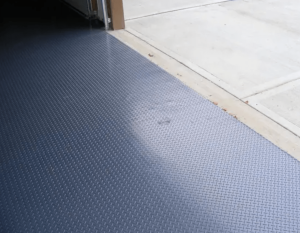
PVC flooring, also known as vinyl flooring, is a synthetic flooring material made from polyvinyl chloride (PVC) resin. It is a versatile and cost-effective option for garage flooring. Here are the pros and cons of PVC flooring in a garage application:
Pros:
- Durability: PVC flooring is highly durable and resistant to scratches, stains, and impacts. It can withstand the heavy use and traffic commonly found in garages, making it a reliable choice for long-lasting flooring.
- Moisture Resistance: PVC flooring is impervious to moisture, making it ideal for garages where spills, water, or moisture may be present. It resists water absorption, preventing warping, mold, and mildew growth.
- Easy Maintenance: PVC flooring is effortless to clean and maintain. Regular sweeping, vacuuming, and occasional damp mopping are usually sufficient to keep it looking clean and fresh. It is also resistant to most chemicals and oils found in garages.
- Comfort and Noise Reduction: PVC flooring has a slightly cushioned surface that provides a comfortable feel underfoot. It offers better shock absorption than harder flooring options, reducing strain and fatigue. Additionally, it helps dampen noise, minimizing echo and sound transmission in the garage.
- Affordability: PVC flooring is typically more affordable than many other garage flooring options, such as epoxy coatings or engineered wood. It provides a budget-friendly solution without compromising on durability and functionality.
Cons:
- Vulnerability to UV Damage: PVC flooring may fade or discolor over time when exposed to direct sunlight. It is not suitable for outdoor or uncovered areas where it may be exposed to intense sunlight for extended periods.
- Limited Design Options: While PVC flooring comes in a variety of patterns, colors, and styles, the design options may not be as extensive as other flooring materials like ceramic tiles or hardwood. However, advancements in technology have expanded the design possibilities in recent years.
- Environmental Impact: PVC is a synthetic material that is not biodegradable and can release harmful chemicals during production and disposal. However, there are eco-friendly and recycled options available for those concerned about the environmental impact.
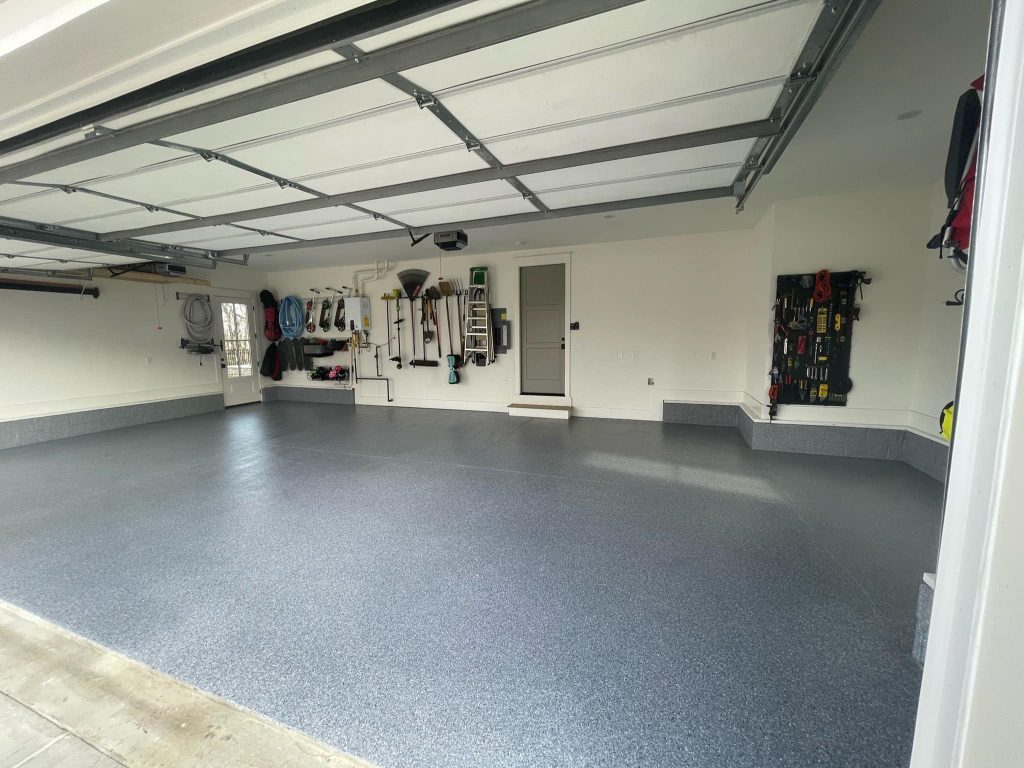
Most people have heard of epoxy, but not polyaspartic coatings. However, polyaspartic coatings have gained significant popularity in recent years as high-performance solutions for garage flooring. This advanced coating technology offers numerous advantages over traditional options such as concrete, epoxy coatings, rubber flooring, and interlocking tiles. We will explore the reasons why polyaspartic coatings are considered superior, highlighting their durability, versatility, aesthetics, and ease of maintenance.
I. Unmatched Durability: Polyaspartic coatings exhibit exceptional durability that surpasses other flooring options. They are highly resistant to impacts, abrasion, chemicals, and UV exposure. Unlike concrete, which is vulnerable to staining and cracking, polyaspartic coatings provide a non-porous surface that repels spills and prevents moisture absorption. Additionally, they are engineered to withstand heavy vehicular traffic and can endure the hot tire pickup that often affects epoxy coatings. The superior durability of polyaspartic coatings ensures a long-lasting, low-maintenance flooring solution for your garage.
II. Versatility and Aesthetics: Polyaspartic coatings offer versatility in terms of aesthetics, allowing you to customize your garage floor to suit your style and preferences. Our floors are available in a wide range of colors, finishes, and decorative options, including metallic and chip systems, enabling you to create a visually appealing and personalized space. In contrast, traditional concrete flooring lacks the ability to provide such customization options, while epoxy coatings may be limited in terms of design choices. The aesthetic versatility of polyaspartic coatings ensures that your garage becomes a visually pleasing extension of your home or workspace.
III. Quick Installation and Use: One of the significant advantages of polyaspartic coatings is their rapid installation and curing process. Unlike epoxy coatings that require multiple layers and longer curing times, polyaspartic coatings can be applied and cured quickly, often within a day. This reduces downtime and allows you to resume using your garage sooner. Furthermore, polyaspartic coatings have a low odor during installation, ensuring a more comfortable environment compared to traditional epoxy coatings. The quick installation and usability of polyaspartic coatings make them a convenient and efficient choice for garage flooring.
IV. Low Maintenance: Polyaspartic coatings require minimal maintenance, providing a hassle-free flooring solution for your garage. Their non-porous surface prevents stains, making them easy to clean. Regular sweeping and occasional mopping with mild detergent is sufficient to keep the floor looking pristine. Unlike rubber flooring or interlocking tiles, polyaspartic coatings do not require periodic adjustments or replacements due to shifting or wear and tear. Additionally, their chemical resistance eliminates the need for frequent resealing or reapplication. The low maintenance requirements of polyaspartic coatings save you time and effort, allowing you to focus on other activities in your garage.
Conclusion:
Selecting the best garage flooring for your garage depends on your specific needs, budget, and preferences. Concrete flooring provides a sturdy and cost-effective option, while epoxy coatings enhance aesthetics and protection. Interlocking floor tiles offer DIY-friendly installation and customization possibilities, and rubber flooring excels in durability, comfort, and safety. But, at Titan Garage Flooring, we believe polyaspartic coatings offer unparalleled benefits when compared to concrete, epoxy coatings, rubber flooring, and interlocking tiles. Their superior durability, versatility, aesthetics, quick installation, and low maintenance requirements make them the ideal choice for garage flooring. Consider polyaspartic coatings to transform your garage into a resilient, visually appealing, and functional space that will endure the test of time.
Think about this, how could we possibly offer the original homeowner a lifetime warranty + a 15 year transferable warranty to the next owner if we did not believe in the durability of our polyaspartic garage floor coatings? When you’re ready to discuss your garage flooring options, we look forward to meeting you and providing a no-obligation quote today.
